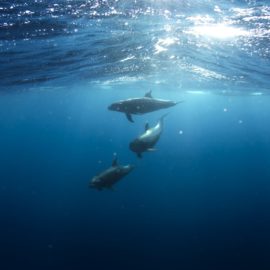
A Gulf deepwater port is coming under fire from environment activists.

Blue Marlin Offshore Port looks to replace an existing natural gas platform offshore and convert the site into a deepwater oil export terminal. A rendering of the proposed new export terminal was submitted to the Maritime Administration. GRAPHIC PROVIDED BY BLUE MARLIN
Environmental protection organizations are trying to stop federal permitting for new deepwater oil export terminals, sending letters to the Biden administration asking for help. Such terminals would compete with the Louisiana Offshore Oil Port. There are four deepwater oil export terminals being proposed in the Gulf of Mexico, three of which are off the coast of Texas and one off the coast of Louisiana. The new deepwater terminals would potentially export crude oil from the Permian Basin in West Texas. The Sierra Club penned a letter to the the Maritime Administration’s Lucinda Lessley and Transportation Secretary Pete Buttigieg asking that permits under review for several different companies be denied and for a meeting with the administration. “The proposed VLCC export fossil fuel terminals undercut the administration’s commitment to tackling climate change and protecting public health, justice and the environment, and are not in the national interest,” Devorah Ancel, senior attorney with Sierra Club, said in a letter co-signed by dozens of similar organizations and community groups. “There are no national interest or security concerns that demand the deployment of large-scale international crude exports facilities, locking in decades more of massive greenhouse gas pollution and the pervasive risks of toxic releases and spill disasters.”
the advocate
Sitting in the Gulf, the proposed terminals would be in the path of hurricanes which are more numerous and more deadly. The three terminals and there location are:
“Dallas-based Energy Transfer LP plans to replace an existing offshore natural gas platform and build a crude oil export project in the Gulf of Mexico 99 miles offshore from Cameron Parish in southwest Louisiana. Energy Transfer hopes to begin construction on the oil export platform during the fourth quarter of 2021 and begin commercial service by third-quarter 2023, according to its application.”
“Energy Transfer, the parent company of Sunoco, is expected to transfer crude oil from a Sunoco storage terminal in Texas to new subsidiary Blue Marlin Offshore Port LLC’s deepwater platform. Energy Transfer already operates the largest above-ground crude oil storage facility in the U.S. in Nederland, Texas, which is the destination for long-haul pipelines from Bakken and Permian shale plays.”
“Bluewater Texas Terminal LLC, a joint venture between Phillips 66 and Trafigura Group Pte Ltd., is proposing a terminal 21 miles off the coast from Corpus Christi. Sea Port Oil Terminal, a deal between Enterprise Products Partners and Canadian pipeline operator Enbridge, is proposed about 30 miles off the coast from Houston. Under review is Texas GulfLink LLC, owned by Sentinel Midstream and proposed 30 miles off the coast from Freeport.”
These terminals will compete with one approved in 2015 and there have been no permits issued since then.
LOOP, a joint venture of Marathon Pipe Line LLC, Shell Oil Co. and Valero Terminaling and Distribution Co., sits about 20 miles south of Port Fourchon in 110 feet of water. It’s the only U.S. offshore oil export terminal capable of loading supertankers that can carry upward of 2 million barrels of oil. For most of its history, LOOP was an import terminal, handling roughly 300 vessels each year from countries such as Saudi Arabia, Iraq and Venezuela, until the decades-long ban on U.S. crude oil exports was lifted in December 2015. LOOP mostly exports sour crude oil, which is produced in the Gulf of Mexico by the Mars platform, a joint venture between Shell and BP. Demand for Mars crude, which is heavier than what is produced in the West Texas Permian Basin and other shale plays, is in competition with countries in the Middle East.
LOOP did not export oil in February. These deepwater terminals are another oil related industry that needs to be watched.



